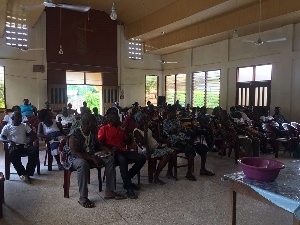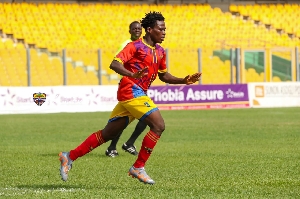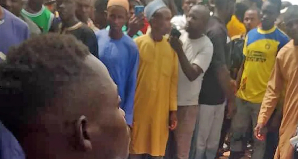ActionAid Ghana (AAG) in partnership with the Commission on Human Rights and Administrative Justice (CHRAJ) has organized a social accountability workshop for people in the Weija-Gbawe Municipal Assembly.
The objective of the social accountability meeting was for the various departments in the Assembly to account for their functions and activities over the past year to the right holders (communities) and for them to give feedback to right holders on their performances.
The meeting held from May 16 to 31st was implemented in fifteen communities: Nsuobri 1, Ashweniagmor, Kofi Donkor, Akweiman, Benianiha, Konkon, Mmaampehia, Kyekyewre, Okaijaman, Nsuobri 2, Hobor, Honise, Amuman, Bisease and Obokwashie.
Madam Adomah Afful, Co-ordinator for ActionAid Ghana, Greater Accra in her address explained that “the activity is meant to empower women and the youth especially to hold duty bearers accountable. It is also an opportunity for these far off communities to assess the previous activities of the various departments so that the Assembly can feed the concerns and suggestions of the people into its plans”.
She added that “the communities are remote and cannot easily travel to the Assembly to report issues so the activity served as an opportunity to exchange contacts with the stakeholders to channel their grievances directly to them”.
The following departments: the Commission on Human Rights and Administrative Justice (CHRAJ), the Department of Social Welfare and Community Development (DoSWCD), the Planning Unit, the National Commission for Civic Education (NCCE), the Ghana Education Service (GES), Ministry of Food and Agriculture (MoFA) and the Domestic Violence and Victim Support Unit (DoVVSU) took turns to sensitise community members on their functions and previous activities.
Community assessment
The communities assessed their performance by means of score cards with generated indicators based on the information provided by stakeholders and what was actually happening in the communities.
During the activity in the various communities, it was realised that participants did not even know about the existence of some of the departments within the Assembly and their functions.
Moreover, community members were more interested in assessing the activities of the GES, the Planning Unit and MoFA as compared to the other departments.
The results of the assessments done by the right holders showed that duty bearers were performing below the expectations of right holders. And so, the concerns of the people would be considered in the plans of the Assembly in subsequent years.
Click 'PHOTOS' for more.
General News of Saturday, 2 June 2018
Source: Adomah Afful













